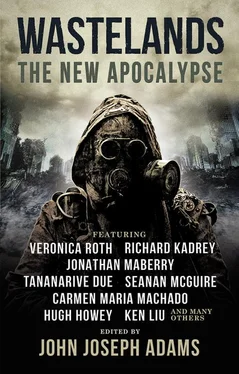A couple of others had come out to help Jim move aside the flatbed trailer stacked with twisted wreckage that served as the north gate. They could move it in and out easy enough, and then use chains and locks to anchor it to rebar loops sunk into concrete pits in the ground. As soon as the Tesla was inside, they shifted and locked the trailer back into place. Dennis rolled the car to a stop in its spot in the back of the clinic, where its charging station was, hooked up to a roof full of solar panels. That had been an epic bit of engineering, to get that all situated. The clinic was the only spot for twenty miles around that still had electricity.
Maggie must have been waiting for them; she came out the front door as soon as the car stopped. “How did it go? Everyone okay?”
“Bouncing baby girl,” Dennis said, climbing from the car and stretching his back. “They gave us capers. We can resurrect fine dining.”
The other doors opened; Melanie herded out the children. Chloë was carrying the youngest propped on her hip, asleep.
Maggie was a middle-aged woman, tanned, brown hair growing gray, tied up in a bun. She wore a wrinkled blouse, jeans, and workboots. Kath looked at Maggie and saw her own mother, who’d been dead for five years now. Maggie and her mom had been friends; hard not to see her as some kind of stand-in. Kath hadn’t wanted to leave home. She’d been waiting, as if her parents might come back. As if Eddie might find her there, and if she left, maybe he never would. Likely, she’d be dead now if Maggie hadn’t made her come to the clinic.
Maggie stopped and gaped, looking among the adults for explanation. “What’s this? Who’re they?”
“Found ’em on the road,” Dennis said, casually, like this sort of thing happened all the time.
The older doctor’s mouth opened, horrified. “We can’t… we don’t… we don’t have enough food! We can’t take care of any more people!”
“Were we supposed to just leave them there?” Kath asked.
Maggie put her hand to her forehead. Her mouth had sunk into a deep frown. “No, of course not. It’s just… God.” She turned and walked off, scratching her hair.
“Come on,” Kath said to Chloë. “We’ll get you set up inside.”
* * *
Kath had them wash faces and hands while she heated up a can of beans to feed them, and made them each drink a glass of water and take a few chewable vitamins. They still had a couple bottles left, and this seemed like a good use for them. After that, the kids curled up on a cot in one of the exam rooms, all three of them together, snuggled under the blanket Kath had tucked them in with despite the heat. Maggie watched from the doorway, arms crossed, clearly unhappy. But she hadn’t really been happy ever, the last couple years.
“We couldn’t just leave them,” Kath insisted.
“And we can’t keep taking in strays. We had to throw out those potato plants on the east side of the building. Rot got them.”
They weren’t strays, Kath thought. They’d been dropped off. People were going to start leaving babies on their doorstep. And the clinic didn’t have enough food. “We’ll try again,” Kath said, because what else could she say? “We’ll figure it out.”
“Yeah, I know, I know. You should get some rest, okay?” Maggie ran a hand over Kath’s hair, something she’d been doing since Kath was five.
Kath smiled grimly, double checked that the shotgun and its spare shells were locked up, and went out to the row of tents lined up along the clinic building. She hadn’t really thought about being tired until Maggie mentioned rest.
Kids and doctors slept in the clinic building. Everyone else used the row of tents, some old-fashioned canvas jobs, a few nylon domes, everything in between. Kath used one of the canvas ones, with the flaps tied up during the day to let in air, mosquito netting in place to try to keep out bugs.
Melanie was already inside, stripped to tank top and panties, sprawled face down on the sheet-covered mattress. If Kath was tired, Melanie was probably flattened after the night she had. But Kath paused a moment anyway, to see if she was really asleep. Admired the curve of her shoulder, the slope of her back where it arced to her hip. Melanie had the most amazing, artful shape to her.
Quietly, moving slowly, Kath pulled off her own dusty, rank clothes, then sat with her journal, squinting in the dark to write a handful of words about the image of those kids in the road, the nerve-wracking groans of the woman, the sticky-hot night air. These days, she mostly kept the diary out of habit, and her handwriting had turned tiny, scrunched—trying to conserve space, since she didn’t know when she’d ever find another blank book. She figured she’d keep writing until she ran out of space.
Kath tried to be quiet, but Melanie woke up anyway. “Hmm?”
“Sorry, didn’t mean to wake you,” she said.
“Hm, s’okay, c’mere.”
Kath set aside the book, collapsed onto the mattress, and Melanie gathered her into her arms. They clung to each other, body to body, and Kath’s near-constant, watchful tension from the night melted a couple of degrees. The scent of Melanie, the soap-and-sweat of her, the warmth of her skin, made Kath feel a little drunk. Melanie shifted, brought her mouth to Kath’s, and they kissed, a little desperately. Melanie sighed, like her own tension was finally fading.
“You okay?” Kath asked.
She squeezed her eyes shut. “We’re going to be back there in two years helping that same woman deliver another baby, there’ll be twenty babies running around that camp and they’ll all be starving—”
Kath hugged her. Melanie shuddered a moment. Trying not to cry, unable not to cry. Kath didn’t know what to tell her.
“That’s optimistic,” she said finally.
“What?”
“That any of us are still going to be around in two years.”
Melanie pulled away and stared at her a moment, then busted out laughing. They fell together in another tight hug, conveying powerful comfort. Anchoring each other.
“Where would you be now?” Kath whispered.
“Med school. I wanted to go to med school.” She laughed, but the laughter turned to crying, like it often did. She didn’t try to hide it this time, and Kath held her till she fell back asleep.
* * *
Just a year or so into their time camping out at the clinic, a fire flattened the strip mall on the other side of the street. Could have been anything that started it, from a leaking gas line and static build up to lightning. Some traveler tossing a lit cigarette. With no one to fight the fire, it burned walls to the ground, collapsed roofs, and kept going. The few shade trees spaced out on the sidewalk went up like torches, and folk at the clinic stayed up all night stomping on ashes and dumping water on hot spots to keep the fire from jumping the road and claiming their home. The barricade of derelict cars, trucks, and trailers had already been put in place by then, but after the fire died down they hauled, towed, and wrangled the barricade another fifty feet out, and added on to it, to increase their buffer zone. To increase the perception of safety. They also spent six months demolishing buildings up and down their own street. Took a long time, clearing all that space with sledgehammers and controlled burns, but it gave them great line of sight after. And more space for gardening. After security, gardening was their biggest preoccupation.
It had only taken a few years for the entire character of that street, the neighborhood surrounding the clinic, to change. When they sat around at night, drinking whatever bottle of booze turned up, and asked how this could happen, they only had to look around.
Читать дальше


![Nick Cracknell - The Quiet Apocalypse [= Island Zero]](/books/28041/nick-cracknell-the-quiet-apocalypse-island-zero-thumb.webp)









